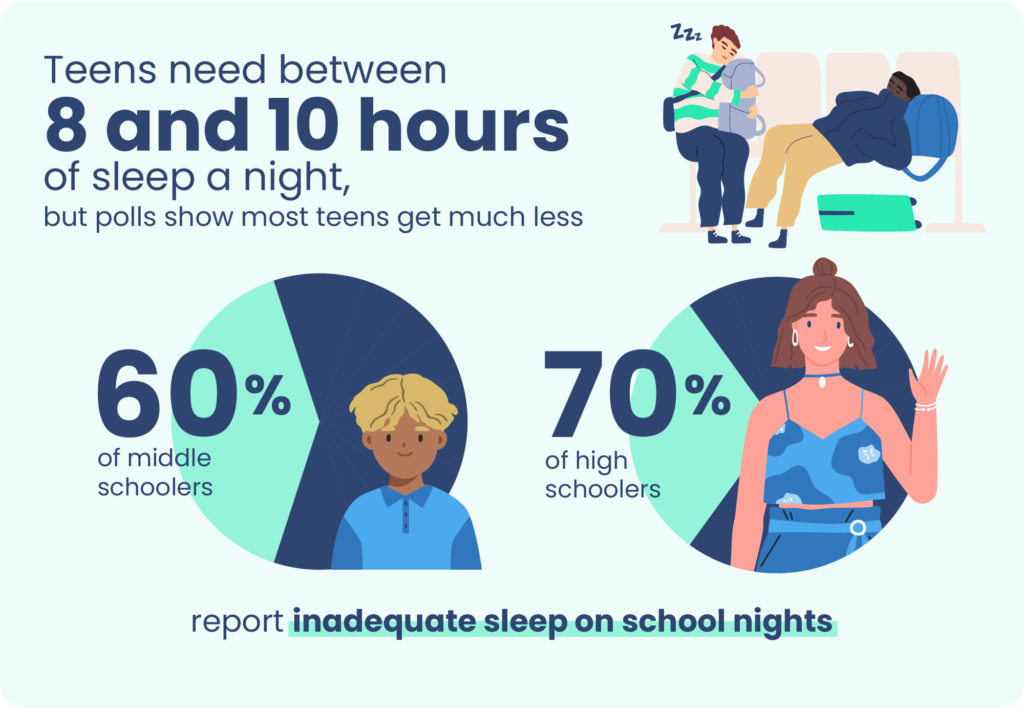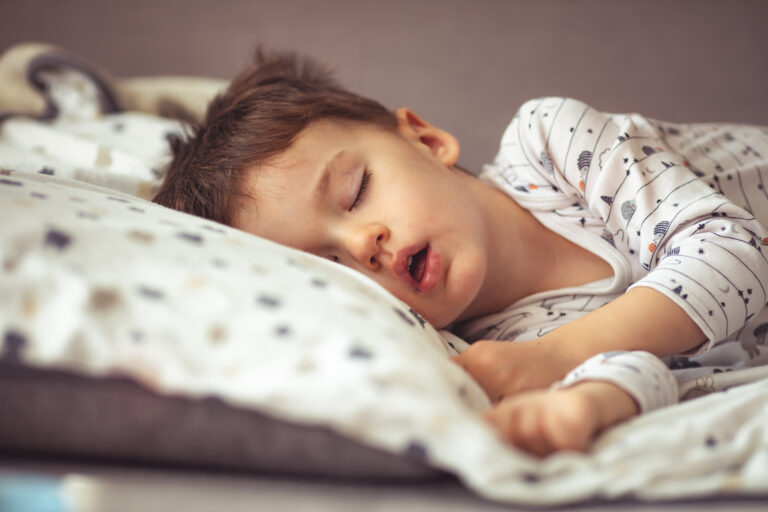
The Sleep Foundation editorial team is dedicated to providing content that meets the highest standards for accuracy and objectivity. Our editors and medical experts rigorously evaluate every article and guide to ensure the information is factual, up-to-date, and free of bias.
Table of Contents
Before a big test or presentation in school, you’ve probably given your child the classic advice to get a good night’s sleep.
Implicit in that recommendation is the recognition that sleep empowers effective thinking and school performance. However, the importance of sleep goes beyond just the night before an exam.
Getting consistent sleep is vital for children and adolescents who are experiencing significant brain development . Unfortunately, a significant number of students in elementary, middle, and high schools across the United States are failing to get enough nightly sleep.
Without enough sleep, children and teens can have problems with attention, memory, and problem-solving. Sleep deprivation can also contribute to emotional issues and behavior problems that may affect academic achievement.
Making sleep a priority is important for parents who want their children to succeed in school. Understanding the causes and consequences of poor sleep and knowing how to address it can allow parents to help children and teens in their academic pursuits.
Sleep needs vary by age. For school-age children ages 6-12 years, 9-11 total hours of sleep per day is recommended . For teens, the recommended amount of sleep is 8-10 hours per day.
Unfortunately, researchers have found that many children in the United States are failing to get the sleep they need. As many as 25% of younger children Trusted Source National Library of Medicine, Biotech Information The National Center for Biotechnology Information advances science and health by providing access to biomedical and genomic information. View Source are believed to suffer from poor sleep and excessive daytime sleepiness.

Sleeping problems are even more prevalent in adolescents. Data from the CDC indicates that over 57% of middle school students and 72% of high school students Trusted Source National Library of Medicine, Biotech Information The National Center for Biotechnology Information advances science and health by providing access to biomedical and genomic information. View Source reported sleeping less than what was recommended based on their age. For as many as 23.8% of adolescents Trusted Source National Library of Medicine, Biotech Information The National Center for Biotechnology Information advances science and health by providing access to biomedical and genomic information. View Source , the problem is significant enough to be considered insomnia, a serious sleep disorder that involves noticeable daytime impairment.
It is widely accepted by sleep experts that a lack of sleep reduces cognitive abilities and can harm school performance in children and teens.
The majority of research about sleep deprivation has been conducted in adults, but many of the same effects are believed to occur in younger people. Although fewer studies have examined lack of sleep in children, the existing evidence indicates that poor sleep can harm academic achievement in several ways.
A direct way that sleep and school performance are connected is through effects on mental function. Some known problems associated with lack of sleep include:
Sleep deprivation can also detract from school performance because of various effects on mood and behavior:
Academic achievement may also be dragged down by missing school. Sleeping problems have been tied to increased absenteeism Trusted Source National Library of Medicine, Biotech Information The National Center for Biotechnology Information advances science and health by providing access to biomedical and genomic information. View Source or tardiness in school. Behavioral factors may contribute to missed school time, and poor sleep is tied to physical problems like lethargy, headaches, and pain that may contribute to absences due to illness.

our partner at sleepdoctor.com
“Life-changing! My anxiety about my son’s sleeping habits were immediately reduced after talking to Sara. She went above and beyond to tailor a schedule to our goals, answer our questions, keep us on track, and check in to encourage us when we just thought we couldn’t do it anymore.”
Rachael B. – Verified Customer
Specialized coaching for babies, toddlers, preschoolers/kindergarteners, and school-age children.
Personalized sleep training plan based on the specific situation and needs of your family.
Access to pediatric sleep consultants who will answer any questions you have as quickly as possible.
Sleep is fundamental to health for children of all ages, including adolescents; however, sleeping problems and their effects on school performance can change based on age. Most notably, teenagers face unique sleep challenges that can give rise to difficulties in school.
A major problem that confronts adolescents is a biological change to their sleep timing that begins around the start of puberty. This change pushes back their internal clock, often by around two hours, making teens inclined to be “night owls.”
Because they go to bed later, many teens are unable to get enough sleep if they have to wake up early in the morning for school or other activities. As a result, average nightly sleep decreases by 40 to 50 minutes between the ages of 13 and 19.
Without enough rest, teens are more likely to suffer from the cognitive, behavioral, and physical effects of sleep deprivation that are detrimental to school performance. In addition, because they often feel most alert later in the afternoon or evening, many teens struggle with classes and exams early during the school day.
Many factors can lead to sleeping problems in children and adolescents, and in some cases, a combination of causes may be involved. Some of the most common contributors to sleeping problems for youth include:
It’s natural for parents to want to do all that they can to support their children in school. Given the importance of sleep for academic performance, parents can make promoting good sleep a pillar of their child’s learning.
Better sleep often starts by first discussing sleep habits and the benefits of sleep with their children. Recognizing the value of quality rest for everyone in the family can be a jumping-off point for practical steps to improving sleep. As part of this process, parents should do their best to model good sleep habits, which can benefit parental health and serve as an example for their children.
A vital step for many families is making sleep a priority. Parents should create a daily schedule that accounts for school start times and other activities and budgets enough hours for children to get the recommended amount of sleep. Having a consistent schedule reinforces the importance of sleep and supports steady sleep habits.
Studies have found that children sleep better when their parents set a bedtime Trusted Source National Library of Medicine, Biotech Information The National Center for Biotechnology Information advances science and health by providing access to biomedical and genomic information. View Source . Having this bedtime not only clarifies the daily schedule but also protects against other activities, even beneficial ones like studying, from gradually cutting into time meant for sleep. In addition to getting more sleep, bedtimes set by parents have been associated with better mood and less daytime sleepiness Trusted Source National Library of Medicine, Biotech Information The National Center for Biotechnology Information advances science and health by providing access to biomedical and genomic information. View Source in children.
As an extension of the firm bedtime, parents can encourage their children to create a relaxing routine to get ready for bed. Following the same steps every night in order to relax and prepare for sleep has been found to benefit young children Trusted Source National Library of Medicine, Biotech Information The National Center for Biotechnology Information advances science and health by providing access to biomedical and genomic information. View Source and is often recommended for people of all ages.
Part of getting ready for bed should mean stopping the use of electronic devices, including cell phones. Most experts advise that both children and adults stop using devices for an hour or more before bed, and if possible, the devices should be kept out of arm’s reach when in bed or out of the bedroom entirely.
Parents can also promote sleep by creating a relaxing sleep environment for their children. Like adults, children sleep better when they have a supportive mattress, comfortable bedding, and a bedroom that is dark and quiet. Parents can work hand-in-hand with their children to make sure that their sleep setting is calming and conducive to quality rest.
If sleeping problems are serious, persistent, or clearly affecting their child’s thinking or behavior during the day, then parents should speak with their child’s pediatrician. A doctor can determine if a child has insomnia, which is distinct from occasional sleeping problems , and make specific recommendations for treatment. A pediatrician can also review a child’s situation to determine if their sleep difficulties are related to an underlying sleep disorder or other health condition.